Cat Health, Digestive Issues In Pets, Natural Pet Health, Worms In Pets
Worming your cat – is there a natural alternative?
‘Worming’ (or more correctly de-worming) your cat is an essential part of being a responsible pet parent. Worms can have serious health effects and not only do they pose a danger to your cat, but some of them can also infect humans and all of them can infect other household pets. Consequently, intestinal worming should never be overlooked.
Here at HomeoPet, our mission is to provide a more natural way to help keep your pets healthy and although there are a range of chemical-based products available on the market today to treat worms, a drug free approach is possible, thanks to Host No More.
Feline Host No More is formulated specifically for cats, is easy to administer, is safe and gentle with HPUS listed Monographs for all major worm types.
But before we look at how Host No More can potentially benefit a cat with worms, we should have a basic understanding of the signs and consequences of worm infestation.
Does your cat have worms?
There are many symptoms that your cat may display that would indicate she has worms, including vomiting, loss of appetite, diarrhoea and weight loss. If worms are left untreated for a long time, the effects can potentially be fatal – particularly for kittens so you should always take veterinary advice before addressing the issue.
The long-term effect of worms in cats include anaemia from a loss of blood, or a blockage in the intestines caused by too many tapeworms – both of which can have devastating consequences, so regular treatment is a requirement for all felines.
Types of worms in cats
Roundworm
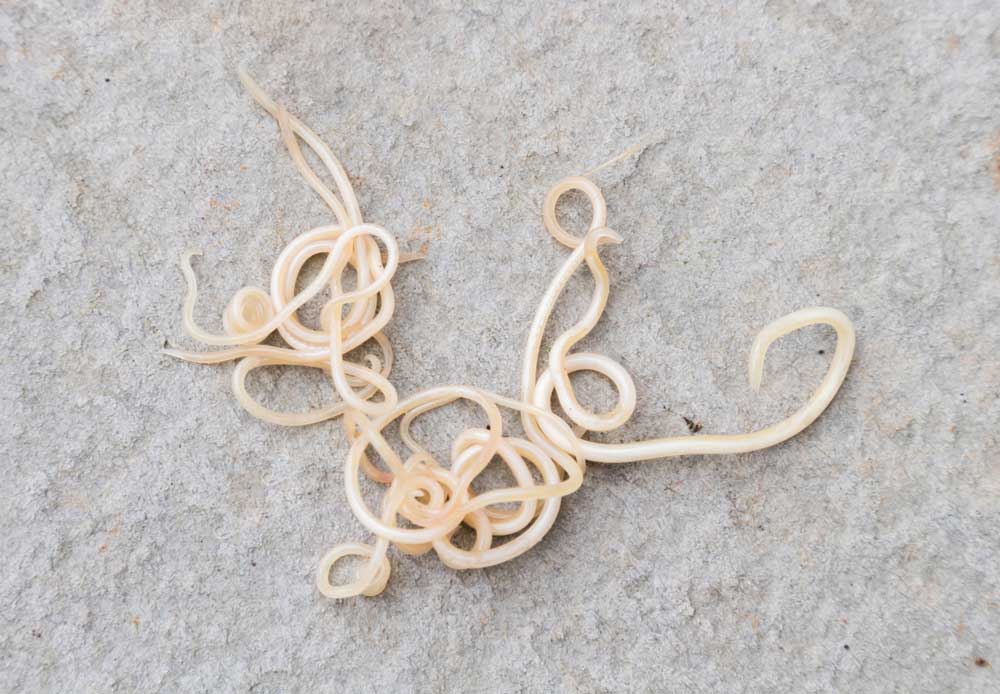
Intestinal roundworms are the most common intestinal parasites in felines and occur in cats of all ages and are usually picked up from an unclean environment. You may notice adult roundworms in your cat’s faeces or vomit. They will appear white or light brown in color and may be several inches long.
Eggs from roundworms are passed in the faeces and can remain viable in the environment for several years. These eggs can then infect other cats either by ingesting eggs directly from a contaminated environment or by eating a prey animal such as a mouse or rat that may itself have eaten the eggs. Consequently, a clean environment is crucial in the fight against roundworm infestation.
Tapeworm
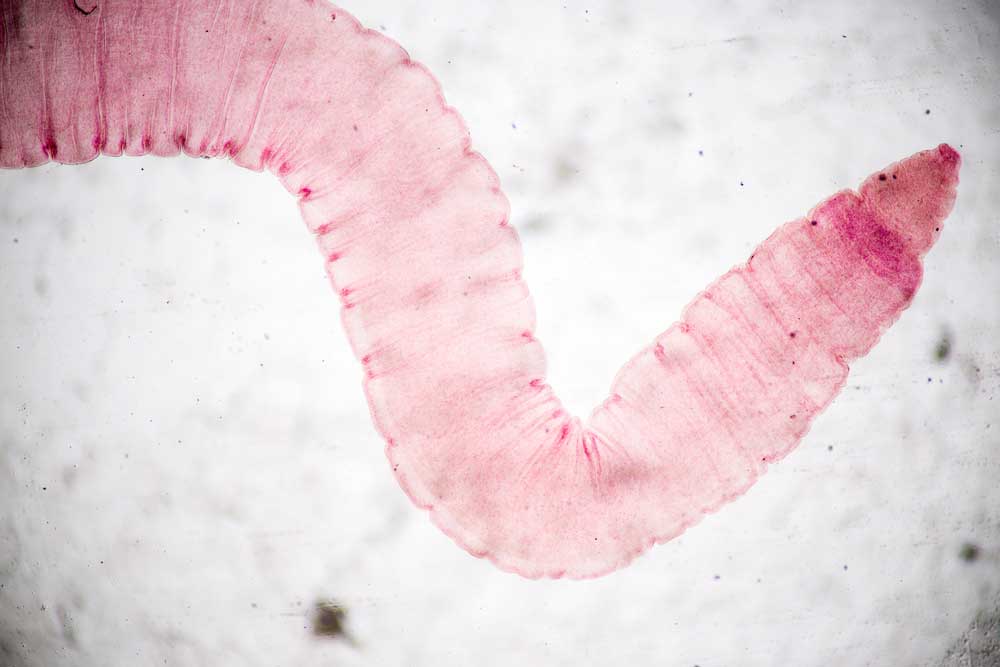
Tapeworms look like small pieces of rice and can be found in the faeces or around the tail and rear area. To complete their life-cycle, all tapeworms require an intermediate host to first eat the eggs from the environment, and then your cat becomes infected by eating the intermediate host.
Both fleas and small rodents (rats and mice) act as intermediate hosts, so your cat is easily infected by ingesting fleas as she grooms herself or by eating an infected mouse or rat that she may have caught while hunting.
Because fleas can carry worms, your indoor cat should be wormed as well. It’s better to be safe than sorry, and both flea and worm treatment is easy and safe, whereas elimination of parasites once they have taken hold can be more complicated. A regular flea and worm treatment regime will help keep your cat – and you – safe and healthy.
Whipworm

Whipworms look like tiny pieces of thread, with one end enlarged, and live and lay eggs in your cat’s intestine which are then passed out in faeces, though they cannot be commonly seen with the unaided eye. They then spend about two weeks on ground developing into infective embryos before being ingested by your cat once again and so continuing on their lifecycle. Whipworms are able to live in an environment anywhere from a few months to a few years and their eggs can be present in soil, food, and water, as well as in faeces and animal flesh, consequently animals are generally infected due to poor hygiene
Hookworm
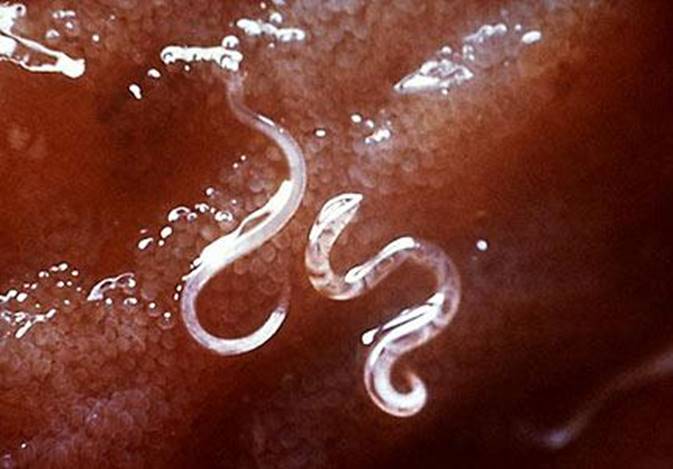
Similar to Whipworms, the very small size of Hookworms makes them very difficult to see with the unaided eye. They are a type of small intestinal roundworm that can cause damage to the lining of the intestine where they attach to the surface, which may result in weight loss, bleeding and anaemia.
Cats may be infected by ingesting eggs from their environment, from eating an infected intermediate host or by the larvae in the environment burrowing through the cat’s skin.
Treating your cat for worms, naturally
HomeoPet Feline Host No More may aid in the recovery from worm infestation and is ideal for the removal of worms where a drug-free approach is favoured. It is also extremely useful for debilitation caused by severe worm infestation where concurrent use with a conventional wormer has been recommended by your veterinarian.
Feline Host No More can also help those animals with an intolerance of the side effects from conventional drugs. Where the owner may report vomiting, diarrhoea, skin rashes or any of the other myriad of side effect symptoms which can occur as a result of such sensitivities.
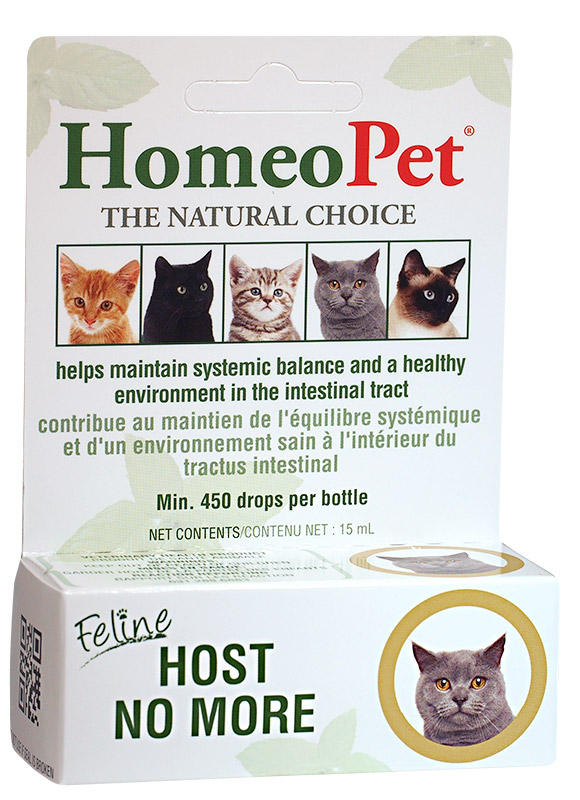
Feline Host No More ingredients have drug monographs in the HPUS the Homeopathic Pharmacopeia covering the following types of worms:
- Tapeworms (Dipylidium Caninum, Taenia taeniaformis )
- Hookworms (Ancylostoma and Uncinaria)
- Roundworms (Toxocara catii)
- Threadworms (Strongyloides spp), though rare in cats
- Whipworms (Trichuris spp)
- Flukeworms can occur in liver & lung (May need Host No More + Conventional wormer)
It’s important to know that HomeoPet Host No More does not kill the worms as there are no toxic or harsh chemicals present. Instead it gently creates an environment in the body that the worms can no longer tolerate, thereby allowing the worms to flush themselves harmlessly from the body. Consequently, proper cleaning of the environment is crucial.
Host No More formulated as a support to your cat’s own natural healing and recovery system, taking up to 2 weeks for the product to reach its maximum potential. During this time, you may see live worms in the stool, which is a good indication. You may continue to see worms coming out for up to 4 weeks after the last dose because it takes that long for worm eggs to hatch. The effect of Host No More may remain in the body for up to 2 months after the last dose, thus inhibiting re-infestation within that time period in spite of contact with worms.
Benefits of Host No More
- Easy to administer. Its liquid formulation means it can be given directly by mouth, in food or water.
- Safe for kittens, pregnant females, adult and senior cats.
- No chemicals, so no toxicity or drug interactions
- Can be combined with conventional wormers to reduce toxic side effects, such as vomiting or diarrhoea
- Aids recovery after worm infestation is removed
- Reduces the risk of reinfection by suppressing egg production
- Can be combined with other HomeoPet products such as Liver Rescue
When you might need to use a drug-based dewormer?
It’s important to note that in debilitated animals, or those with large worm burdens where the body is unable to raise an immune response, Host No More should be combined with conventional or herbal wormers. If in doubt consult your veterinarian, or feel free to contact our customer care line.
If a drug-based approach is required for your cat, it’s reassuring to know that Host No More makes an excellent complement. In such situations, treatment with Host No More can be started before the administration of conventional wormers. This approach can help to avoid the serious consequences of a sudden kill off large numbers of worms in a heavy infestation, which can lead to obstruction and other serious consequences in your cat.
Additionally, some of the ingredients in Host No More, are listed in the HPUS to help detoxify chemicals in the body and so may help pet patients who are sensitive to and yet need conventional wormers. Similarly, conventional wormers can be needed in cases where there is a severe worm burden, particularly in poorly nourished cats or kittens and especially in those who may also have compromised immune systems, such as those with infections on top of a worm burden. In such cases, Feline Host No More may not be fully effective in removing the worm burden as the cat or kitten is incapable of mounting a response to throw out the worms, but it may help the sickly cat or kitten deal with the chemicals in the conventional wormer.
In non-responsive cases or in those obviously not well, always consult your veterinarian as cats and kittens can die of severe worm burdens, but even then, it is possible to use Feline Host No More in conjunction with the conventional medications.




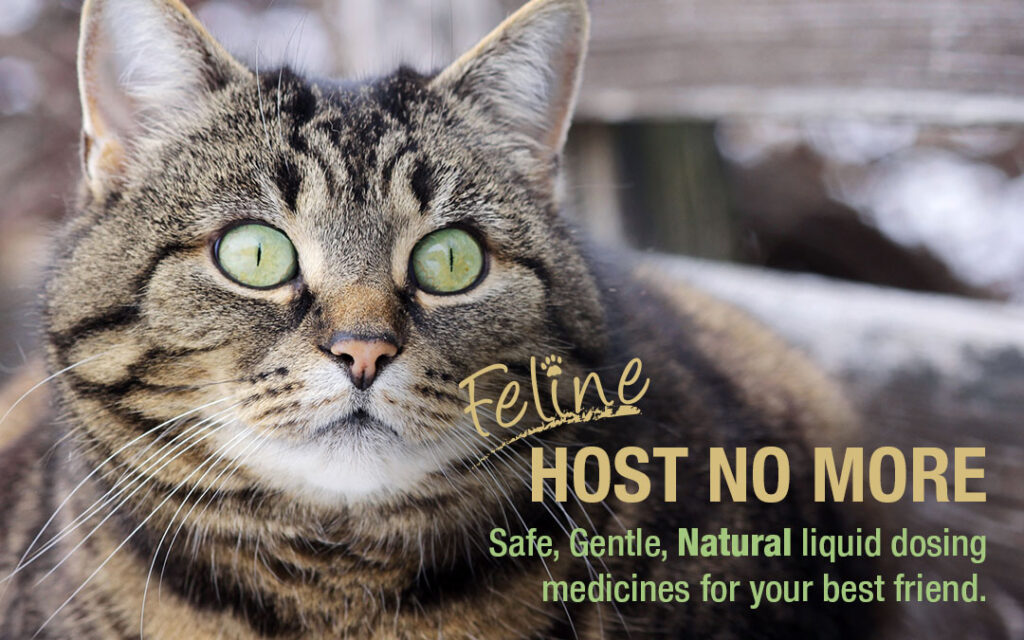

I have used WrmClr several times for my cat and it’s amazingly effective, and without side effects. I have used several HomeoPet products over several years and have been astounded at the wonderful results I’ve attained. The Customer Care line has been wonderfully helpful, as well, as I’m not a homeopath so have questions sometimes. I cannot say enough good things about this company and their products.
Thank you Sharon! Absolutely delighted to hear it 🙂
Pingback: Worming your dog – is there a natural alternative? - HomeoPet
Hello…
Can anyone tell me if the correct dose for an adult cat is actually 10 drops per dose…
That’s 10 drops three times a day… 30 drops a day?
i’ve given my cat 10 drops this morning and it’s knocked him out the day… Is this normal?
Thank you.
Hi Roger,
You are correct, the dosing for an adult cat is 10 drops per dose 3 times a day (so 30 drops in total per day).
While our products are completely safe some animals experience a sensitivity to the alcohol preservative in the product when dosing directly in the mouth, which sounds like could be the case for your cat.
If you dose the drops in food or water going forward you should notice this changes since dosing either of these ways will give the alcohol a chance to evaporate which will take care of the sensitivity.
Of course please let us know if you have any further questions. Have a great day!
Daniela @ HomeoPet
Pingback: Does your pet have worms? - HomeoPet